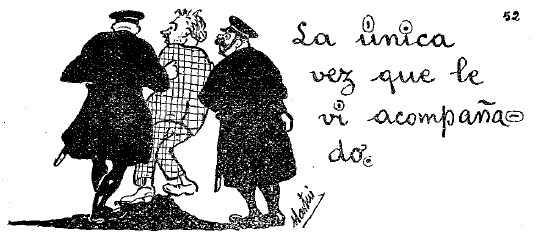
| Языки :: Испанский |
| Аудио |

 |
|
 |
|
149 |
Español |
Spanish |
|
Lección Cincuenta y dos (52) |
||
| Para variar... | For a change [to change]... | |
| 1 |
En el baile. - Oye hija mía, ¿qué te ha dicho ese joven con quien acabas de bailar (1)? |
At the ball. - Listen [hear] my daughter, what did (he) tell you, that young man with whom you have just danced [finish dancing] ? |
| 2 | Me ha dicho que antes de conocerme, el mundo era para él un desierto. | He told me that before knowing me, the world was a desert for him. |
| 3 | Lo comprendo, pues baila como un camello. | I understand him, for he dances like a camel. |
| 4 |
En el apuro. - ¿Y por qué no se muda usted a otro piso más pequeño y de menos precio? (2) |
In trouble. - And why don't you move (house) to another smaller and cheaper apartment? |
| 5 |
Por que yo no puedo pagar ni el pequeño ni el grande y en éste estoy más cómodo. |
Because I can pay neither (for) the small one nor (for) the large one and in the latter I am more comfortable. |
| 6 |
En la lechería. - Déme usted un litro de leche de sesenta céntimos. |
At the dairy . - Give me a quart of milk at 60 centimes. |
| 7 | No queda más que de ochenta, pero la haremos en seguida. | There remains only some at 80, but we'll make some (la, feminine) presently. |
| 8 |
La razón. - Estoy malo, doctor. - ¿Qué siente usted? |
The reason. - I am unwell, doctor. - What do you feel? |
| 9 |
Un fastidio insoportable. - Eso es que se escucha usted demasiado. |
An unbearable dullness. - That's because [that] you listen to yourself (= coddle yourself) too much. |
| 10 |
El desconocido. - ¿Quién es ese hombre? - No lo sé; hace ya mucho tiempo que no le conozco (3). |
The stranger. - Who's that man? - I don't know [it]; it's a long time since [it makes much time that] I did [don't] know him. |
| EJERCICIOS | EXERCISE : | |
| 1 | ¿Conoce usted a ese hombre? | Do you know [at] that man? |
| 2 |
Le (or : lo) conozco de vista
hace ya varios meses, pero no se como se llama. |
I have known [know] him by sight for [it makes already] a few months, but I don't know how he is called. |
| 3 | Le (or : lo) encuentro muy a menudo por ahí, y siempre va solo. | I very often meet him round here, and he is [goes] always alone. |
| 4 | La única vez que le vi acompañado fue en el café Toledo, el mes pasado. | The only time I saw him accompanied was at the Toledo café , last [past] month. |
| 5 |
¿Y con quién estaba? - Con un desconocido, que parecía extranjero. |
And with whom was he? - With a stranger, who looked foreign. |
| 6 | Adiós; me voy, que tengo prisa. | Good bye, I'm going, for [that] I am in a hurry. |
| 7 |
Adiós. ¡Oiga! me han dicho que se va usted a mudar de casa; ¿es verdad? - Sí, es cierto. |
Good bye. I say, they told me that you're going to move [from] house; is it true? - Yes it's right. |
| NOTES. | |
| 1 |
Oir, to hear, is irregular. ¡Oye! (aw-iay), ¡Oiga!, hear!, are said for : listen! or : I say, look here. - A mother speaking of her daughter says : mi hija, but speaking to her : hija, or hija mía. - Joven (adj.) : young; used as a noun, it is a young man or girl : un joven, una joven. |
| 2 |
Mudar or mudarse, to change and also to move
house (mudar de casa). - As there is a confusion between cuarto, apartment, and cuarto, room, one says piso (floor, story) to indicate that an apartment is meant. |
| 3 |
Conocer, to know; yo conozco, usted conoce, I, you know. This irregular form is also found in parecer, to appear, seem : yo parezco, usted parece, I, you seem. - Yo lo conozco or yo le conozco, indifferently. |
| Sent. 3 : often : a menudo; liter : at small (minute) intervals. | |
|
Sent. 4 : every time alone can be replaced in English by one,
is translated by único, not by solo. |
